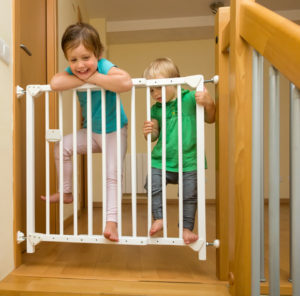
According to the National Children’s Office (2000), newborns to 4 year olds are most at risk from home accidents. They have also found that most accidents happen in the living room and that boys are more likely to be involved in an accident than girls. Official figures from the CSO show 13 children under 15 died in the home in 2003 – the last year for which full data is available – with five deaths caused by fire, two by falls and six more from unspecified accidents. Most household accidents involving children could be avoided through care and common sense. Here are some ways in which you could help to reduce the risk of accidents in your home.
General Safety in the Home
Before you start to look at baby specific safety hazards it is important to ensure that you have considered the general safety features in the home for all the family.
- Fit a smoke alarm on every floor and check it monthly to ensure it is working.
- Keep a fire extinguisher and a fire blanket in an accessible place in your kitchen. Ensure it is checked regularly and that all adults in the home know how to use it in case of a fire.
- Discuss what to do in the event of a fire with your older children.
Each home should have a fully stocked first aid kit in an accessible place. Your first aid kit should contain:
- Plasters
- Varying sizes of sterile wound dressings
- Antiseptic solution
- Burns dressing
- Bandages
- Eye pad
- Gloves
- CPR barrier mask
- First aid guide book
Baby-proof the House
This is done as a means to reducing the risk of accidents happening, however, it doesn’t replace constant adult supervision. It is advisable to baby-proof your home before your babies are mobile so that you always remain one step ahead of them. You can buy a home safety starter pack in many stores to get you started. The following are the basic baby-proofing steps to take, however, each home will have different hazards and you will need to do your own assessment of hazards in your home.
- Fit drawer and cupboard catches
- Fit socket covers
- Install a safety gate at the top and bottom of the stairs
- Put a fire guard around your fireplace
- Pad any low corners such as the coffee table or TV unit
- Use a furniture strap to fix any tall free-standing furniture to the wall such as a tall bookcase
- Ensure there are no cords hanging low from curtains and blinds
- Fit child resistant window locks
- Use ‘anti slam’ door stops
- Use a heat protector film on the oven front
- Place a large non-slip bath mat in the bath
- Keep a playpen in the kitchen or living room so that you have a safe place to put your babies if the phone rings or you need to go to the bathroom
- Store medicines and cleaning agents out of reach in a high lockable cupboard.
Day-to-day Safety Measures
It is important that there is ongoing safety awareness in the home. Many accidents are caused by carelessness of a parent, childcare minder or visitor to the home.
- Ensure all cords from kettles and irons are kept high
- Never leave your babies unattended in the bath (not even for a second)
- Always strap your babies into their highchair or other baby seats
- Keep floors and stairs free of toys and obstructions
- Never leave babies unattended on high surfaces (e.g. changing tables)
- Never place baby seats or bouncers on raised surfaces such as a table
- Always have an escape route in case of fire, for example ensure that the keys to both the front and back door are kept near it.
- Don’t hold a hot drink and a baby at the same time
- Run cold water in the bath first and always check the temperature before placing your baby in the bath
- Empty the bath water immediately after bathing
- Close dishwashers, washing machines and tumble dryers after use
As above, this list is non-exhaustive and needs to be assessed by individual parents’ as the risks are different in every home.
In case of accidents we recommend that you keep a list of emergency contact details on a notice board or fridge for babysitters or minders. You should also include any allergies that your children have and any medication that they are taking on the list. .
It is also advisable to do a course in first aid, which covers CPR and is approved by the Irish Heart Foundation. Phoenix Safety is currently offering courses in Children’s First Aid at a discounted rate to IMBA members. For more information, check out their website at http://www.phoenixsafety.ie/.
